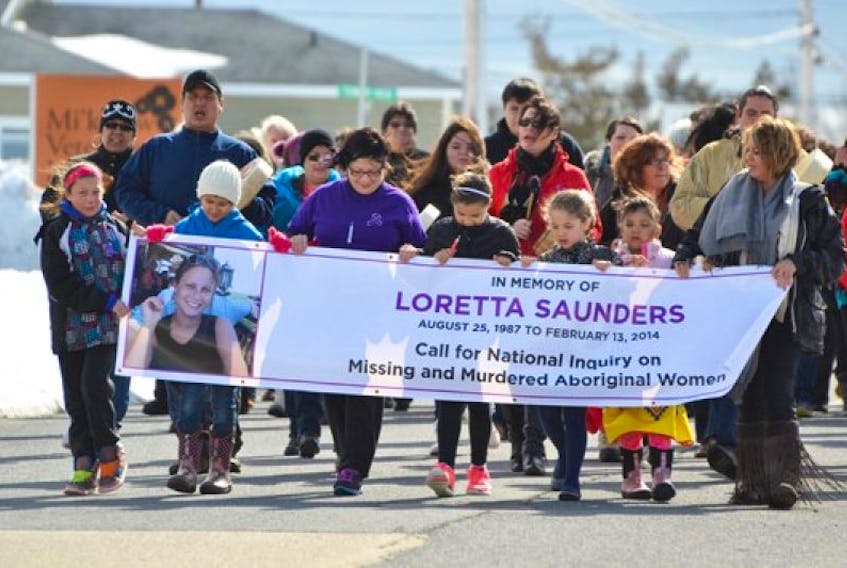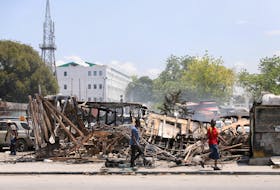GATINEAU, Que. — After nearly three years of hearings and evidence gathering, the final report from an inquiry into missing and murdered Indigenous women and girls and 2SLGBTQQIA people in Canada was released Monday and went straight to the heart of the issue.
“This is genocide,” Chief Commissioner Marion Buller told a packed room at the Museum of History in Gatineau at the inquiry’s closing ceremony.
The report describes decades of assimilation and genocidal government laws that have led to high rates of violence against Indigenous women.
“Canada is a settler colonial country. European nations, followed by the new government of ‘Canada,’ imposed its own laws, institutions, and cultures on Indigenous Peoples while occupying their lands,” the report’s executive summary reads.
“Racist colonial attitudes justified Canada’s policies of assimilation, which sought to eliminate First Nations, Inuit, and Métis Peoples as distinct Peoples and communities.”
The solemn, four-hour ceremony included song and dance, speeches from commissioners, elders and others, and ended with a performance of the Mi’kmaq honour song. Many attendees wore red in memory of the staggering number of Indigenous victims of violence.
Valerie Courtois, an Innu woman living in Happy Valley-Goose Bay, was one of the emcees. She said the calls for justice are incumbent on every single Canadian, no matter their origin.
“The only way that there is going to be action from this is if we don’t just depend on our governments. There are calls in the report for Canadians, there are calls in the report for the resource sector, there are calls in the report for all sectors that impact the lives of women, and so it’s up to each and every Canadian to take this on,” she said.
“This is time for action.”
"...it’s up to each and every Canadian to take this on." — Valerie Courtois
Entitled “Reclaiming Power and Place,” the report delivers 231 recommendations in the areas of health, security, justice and culture directed at governments, institutions, industries and Canadians.
These calls include developing and implementing a National Action Plan to ensure equitable access to employment, housing, education, safety and health care; providing long-term funding for education programs and awareness campaigns related to violence prevention and prohibiting the apprehension of children on the basis of poverty and cultural bias.
Colonial violence, as well as racism, sexism, homophobia, and transphobia against Indigenous women, girls, and lesbian, gay, bisexual and transgender people, has become embedded in everyday life, the report says, whether through interpersonal forms of violence, through institutions like the health-care system and the justice system, or in the laws, policies and structures of Canadian society.
The result has been that many Indigenous people have grown up normalized to violence, while Canadian society shows an “appalling apathy” to addressing the issue.
This, the inquiry report states, amounts to genocide.
In his address, over calls of “genocide” from attendees, Prime Minister Justin Trudeau promised to continue to decolonize Canada’s existing structures and work to end the racism, sexism, and economic inequality that has allowed these crimes to take place.
“You have my word that my government will turn the inquiry’s calls for justice into real, meaningful, Indigenous-led action,” he said.
One of the reports key findings was that the Indian Act creates marginalization, displacement and isolation and exposes First Nations women and girls to more violence.
Rebecca Moore, a Mi’kmaq woman from Halifax, wrote a foreword for the report.
“The Canadian government prevents Indigenous women and their families from having the autonomy to earn a moderate livelihood and achieve their own safety and security,” she wrote. “Until Indigenous women are given the power and authority to self-determine what happens within their own territories, we will always be at risk under Canada’s ‘Rule of Law.’”
Commissioner Oajaq Robinson said rebuilding Canada into a decolonized nation requires an equal partnership between all Canadians and Indigenous peoples.
‘This is history’
Cheryl Maloney is a political science professor at Cape Breton University and founding president of the Eastern Door Indigenous Women’s Association, which was heavily involved in the inquiry process.
She said the stories shared from families in Atlantic Canada are well reflected in the final report.
“The reality that’s in that report is a Canadian truth,” she said.
Maloney said the challenge now is not just ensuring Indigenous women and girls are kept safe but also valued and empowered.
Twitter: @notandrea
In her own words
The final report of the national inquiry into missing and murdered Indigenous women and girls compiled information from more than 2,000 family members, survivors of violence, and experts. Here is one story.
Kimberly J.
Within Inuit communities, the inquiry report says, the crisis of child welfare is “exacerbated by distance and the way in which Inuit children and youth are often sent south to encounter a completely different way of life.” The mistrust of many Inuit for colonial systems and laws is also heightened by the relatively recent experiences of relocation and colonization in the North. Harriet (Rutie) and her husband Johannes L. of Nain, Labrador, spoke to this, in memory of their daughter Kimberley J., who was murdered by her boyfriend at age 20.
“And then there are, like, certain families who live in poverty, who don’t have the means to support their children and grandchildren and do not have enough money to support their families. And this is because the education system has taken children away from their Inuit families as if … the education system has become more responsible for the children, for the education of the children, so that responsibility has been taken away from Inuit; so our culture, our language is no longer being taught to our Inuit children and grandchildren. Our Inuit way of being is being used less and so our way of life has been diminished. There are youth who have forgotten whether they are Inuit. They ask, ‘Am I Inuit or am I not?’”









